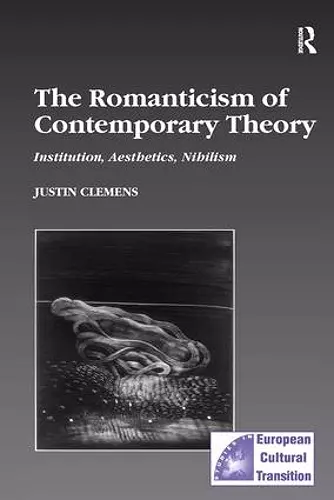The Romanticism of Contemporary Theory
Institution, Aesthetics, Nihilism
Format:Hardback
Publisher:Taylor & Francis Ltd
Published:11th Aug '03
Currently unavailable, and unfortunately no date known when it will be back

This book explores how contemporary theory remains influenced by Romanticism, revealing connections through various philosophical and literary works. The Romanticism of Contemporary Theory offers valuable insights.
In The Romanticism of Contemporary Theory, Justin Clemens argues that contemporary theoretical frameworks remain deeply rooted in Romantic thought. Despite claims to the contrary, he illustrates how Romanticism's influence persists in various philosophical and literary contexts. By engaging with the works of notable thinkers such as Phillipe Lacoue-Labarthe and Jean-Luc Nancy, Clemens provides a comprehensive analysis of the connections between Romanticism and the contemporary intellectual landscape.
The book is structured into two main sections: 'Contexts' and 'Interventions'. In the 'Contexts' section, Clemens explores the historical and institutional evolution of Romantic criticism, identifying recurring themes such as the desire to escape Romanticism and the implications of modern academic philosophy. The 'Interventions' section delves into close readings of influential figures like Jacques Lacan, Gilles Deleuze, and Eve Kosofsky Sedgwick, revealing how their works reflect Romantic ideas even as they attempt to challenge them.
Clemens' examination extends to key concepts in Lacan's theories, Deleuze and Guattari's notion of 'multiplicity', and Sedgwick's contributions to Queer Theory. He also critiques the anti-Romantic positions of Ian Hunter and Alain Badiou, ultimately demonstrating that even their arguments contain traces of Romantic thought. The Romanticism of Contemporary Theory is an insightful resource for scholars in literary theory, philosophy, and cultural studies, highlighting the enduring legacy of Romanticism in contemporary discourse.
'This title has been dying to be written and the excellence of this book lies in its breathtaking range, insistently interrogative terms of analysis and high theoretical acumen... Clemens's overview is excellent, in its parsing of so many minor and key figures. It clearly defines and documents all of the terms, paradoxes and way stations in this impasse that everybody mentions and for which no-one has offered any extensive or entirely satisfactory thinking through. That he does so with extraordinary reach, philosophical regard and, at times, breathless condensations is deeply impressive... makes for an invaluable reference work as well as a difficult pleasure... this book is a splendid achievement. Its remarkable theoretical conversance and high philosophical reach make it indispensable for anyone with interests in the history of contemporary theory, recent philosophy and Romantic studies, and certainly for anyone who professes to be really working on the boulevards and in the lounges of cultural studies.' Cultural Studies Review
ISBN: 9780754608752
Dimensions: unknown
Weight: 498g
240 pages